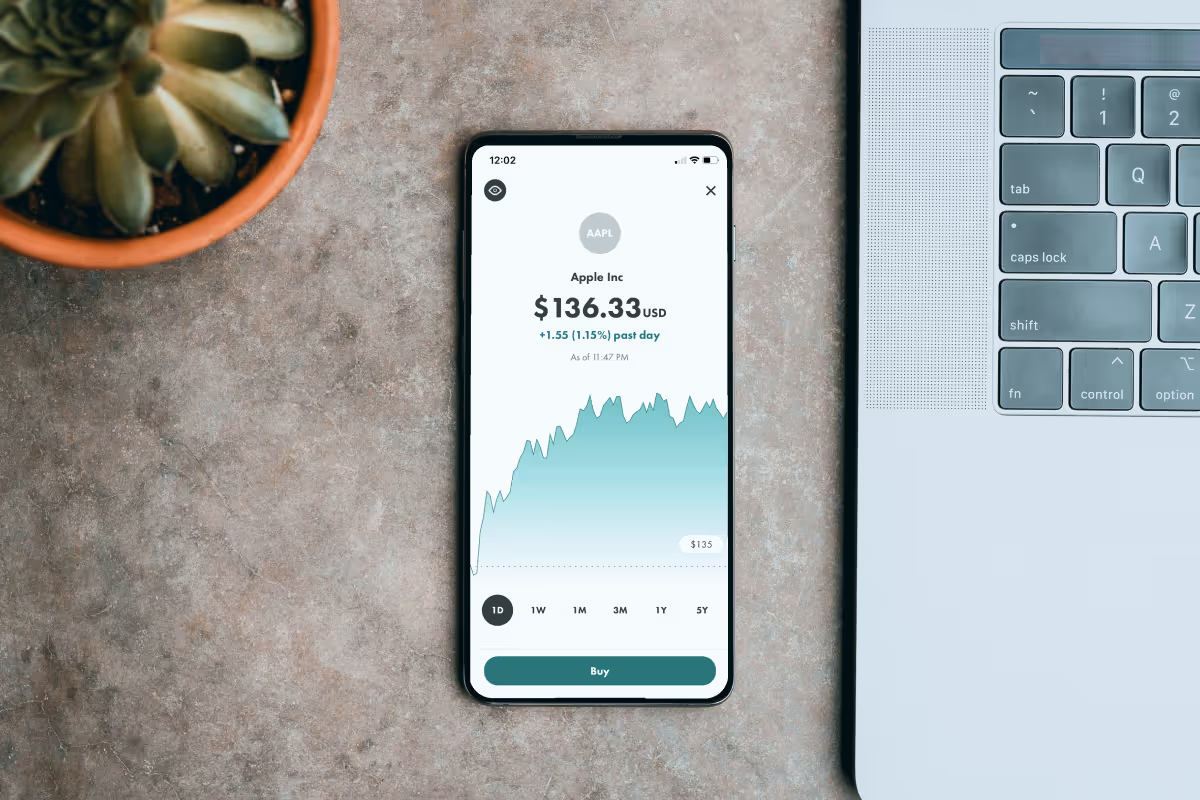The real estate industry is one of the oldest in the world. At the same time, it is one of the fastest-growing industries.
If we put these two facts together, we'll see that real estate is facing a big challenge – to transform its brick-and-mortar processes into digital ones. For the record, 58% of real estate companies stated they already have a digital strategy. So to survive in the real estate market, you should act fast.
By acting fast, I mean adopting digital transformation in real estate software development. The use of cutting-edge technologies, such as virtual tours, automated transactions, smart contracts – these are the topics of this article and even more.
What is Digital Transformation in Real Estate?
To understand what real estate digital transformation is, we should define 'digital transformation' first. Digital transformation is the shift of business processes to digital ones. It follows digital transformation in real estate is the adoption of digital technologies within the real estate industry.
Sounds easy and a bit abstract, right? To clear things up, let's take a look at the example of real estate digital transformation.
Real Estate Digital Transformation Example
If you're into the real estate sector, you've definitely heard of the website Realtor.com. Apart from its basic function – helping people find homes for sale/rent, new construction homes, and shop mortgages, the Realtor.com app for Android offers a cutting-edge feature. They implemented AR technology to enable users to learn a particular object's price, square footage, etc., by simply pointing a smartphone at the building.
Now customers can have all the important information about the real estate objects without contacting a real estate agent. It’s just the tip of the digital transformation examples, I'll mention more a bit later.
Why Real Estate Digital Transformation Matters
We have figured out "what's digital real estate?" The next question arises "why does it matter so much?" To answer this question, I suggest considering two points of view: a business one and a customer one.
From a business point of view, digital transformation in real estate is essential to survive in the market. According to Deloitte, 41% of real estate companies state that they have already accelerated efforts to use technology and tools in redefining their processes. It means they use smart contracts, multiple CRM systems, and other digital solutions that improve their operational processes, cut costs and make them more attractive for investors, potential employees, and customers.
From a customer point of view, digital transformation in real estate is the only way to meet evolving customers' needs. Homes.com asked 2,000 home buyers and found that 44% of them feel nervous during their homebuying process. Not to mention that 95% of home buyers use the internet to find homes in the U.S. in 2021. People demand changes, and the numbers only highlight the importance of implementing real estate digital transformation.
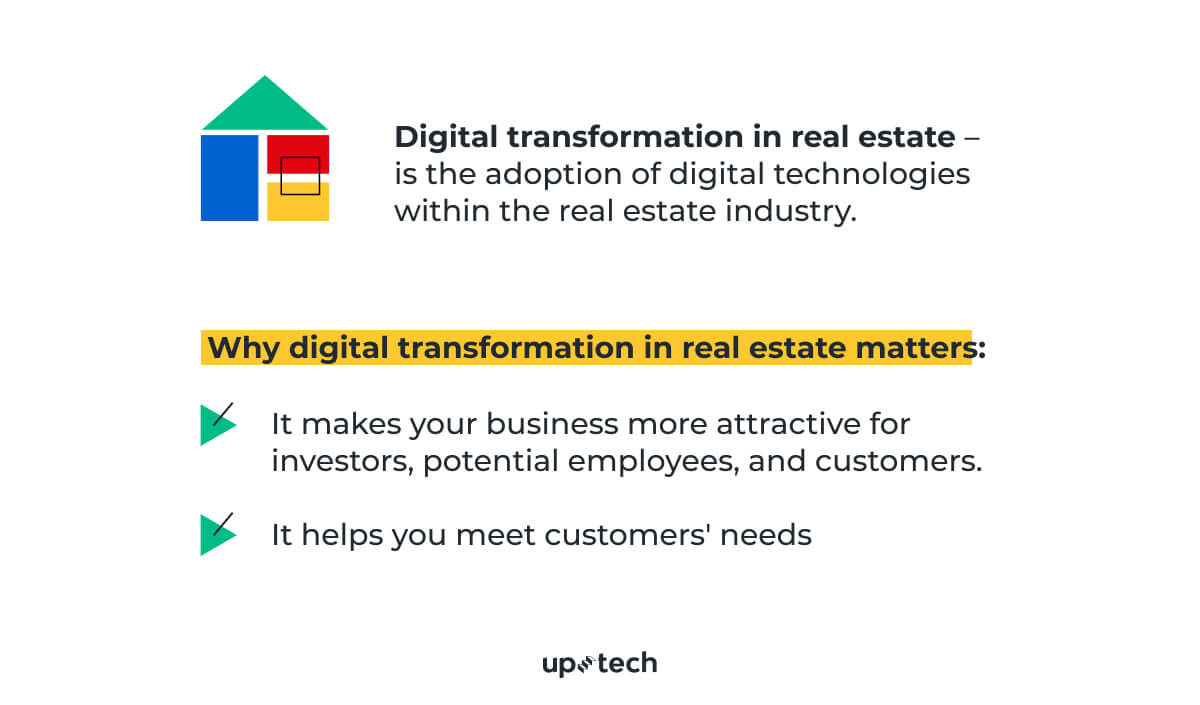
Having launched several real estate products, I can account firsthand for the positive impact of creative and innovative digital solutions on users' problems in real estate. In the next block, I'll list 6 elements without which real estate digital transformation is impossible.
6 Real Estate Digital Transformation Elements
Digital transformation in real estate is a very fragile term. To define it, Deloitte, in its recent report, proposed 6 key elements that characterize digital transformation. I have some thoughts on each to share with you.
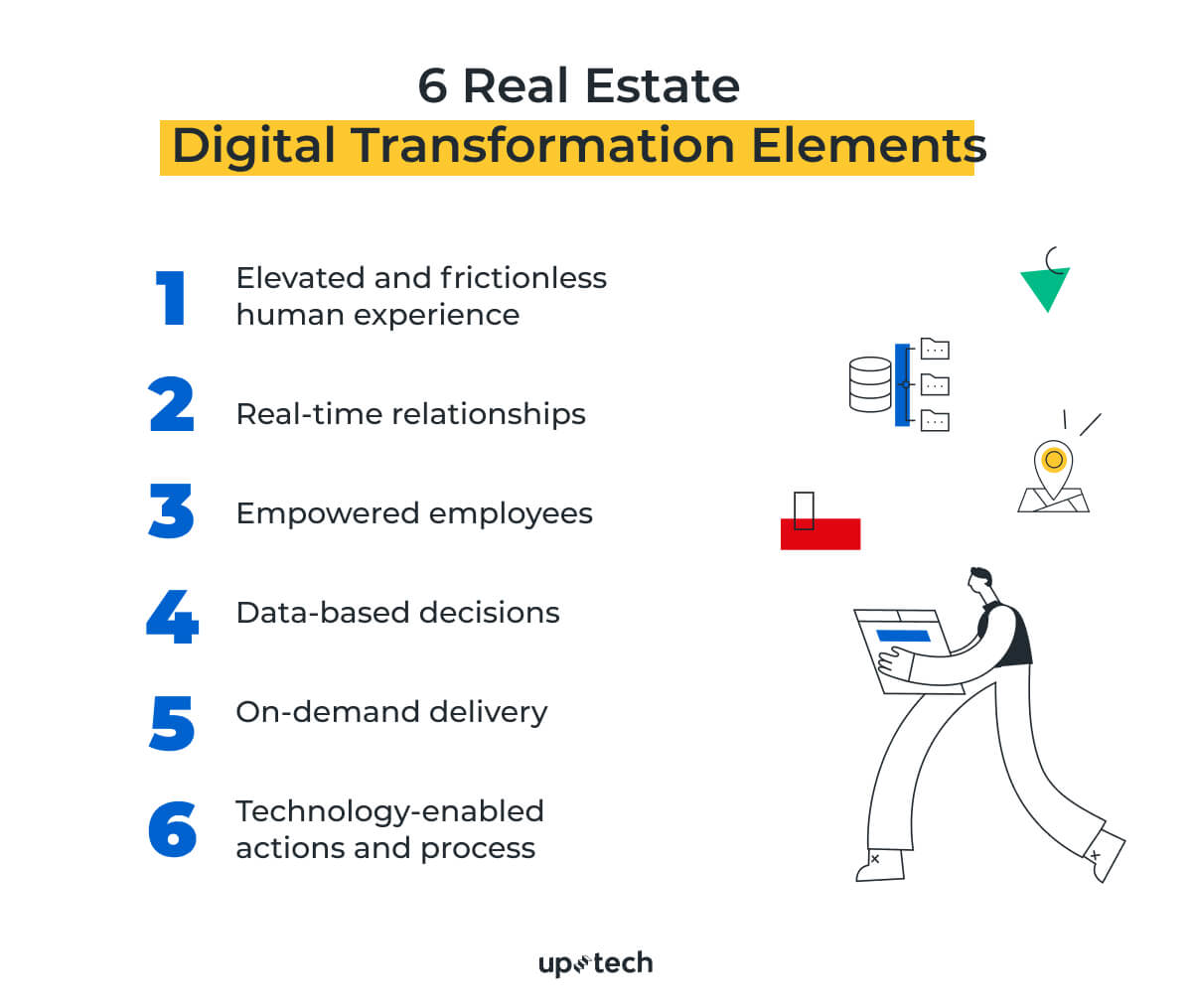
Elevated and frictionless human experience
Everyone who has ever bought or rented a house knows how frustrating and complex this process could be. Digital transformation always aims to simplify this journey.
This is what Yaza, a real estate app for recording and sharing video home tours did. They launched the mobile app with 3D home virtual tours feature when the pandemiс started. It allowed real estate agents to record a home tour once and send it to the potential home hunters through the link. This is a great example of how a business adopts to social changes and elevates human experience.
Real-time relationships
Scott Rechler, an American businessman and CEO of RXR Realty, once said:
"The future of real estate is no longer about delivering four walls to tenants. Instead, it's about creating a unique, personalized customer experience that fosters meaningful interactions, collaboration, and productivity."
RXR showed how one digital transformation could enhance the real-time relationship by developing an app that allows residents to use digitally-enabled concierge services like housekeeping and grocery delivery.
Empowered employees
Digital transformation in real estate not only accommodates the expectations of home buyers but also makes the entire ecosystem more efficient, including homeowners, real estate agents, brokerages, and mortgage lenders.
- Online contract generators provide the essential data directly from the customers without in-person contacts.
- Single inbox for everything, e.g., Intercom, Paperless Pipeline, creates a less stressful environment.
- Cloud-based software transforms property management systems.
All in all, new technologies simplify and speed up operations, and more employees work part-time or are hired as freelancers, thus have higher chances for a comfortable work-life balance.

Data-based decisions
We make heart or algorithm decisions. Big data is responsible for algorithms. Using better data is another essential element of digital transformation in real estate.
How does big data work in real estate? I believe many people decide what property to buy based on the location and price. Now with real-time data insights, people access the information on the crime rate, future infrastructure projects, and potential environmental risks in the preferable area. This ability to micro-level information helps people make more educated and data-driven decisions.
On-demand delivery
It's hard to imagine digital transformation in real estate without on-demand services. Millennials and Gen Z are asking for temporary services, and the space-as-a-service model satisfies this need.
This is where Parkaze comes in. Package is the parking management platform using the space-as-a-service concept. As an owner of a parking spot, you provide a parking space while it is not in use for a couple of hours or days. As a driver, you can find cheaper and safe parking alternatives wherever and whenever you go.
Technology-enabled actions and process
The last element of digital real estate is more a summary of all I mentioned above. VR home tours, cloud-based software, smart contracts, and big data algorithms make the real estate process more tech-savvy and lead to a seamless experience.
The Latest Technologies in Digital Real Estate
With the evolution of digital transformation in real estate, more and more new technologies appear. Below I gathered top-5 innovations that are disrupting the industry.
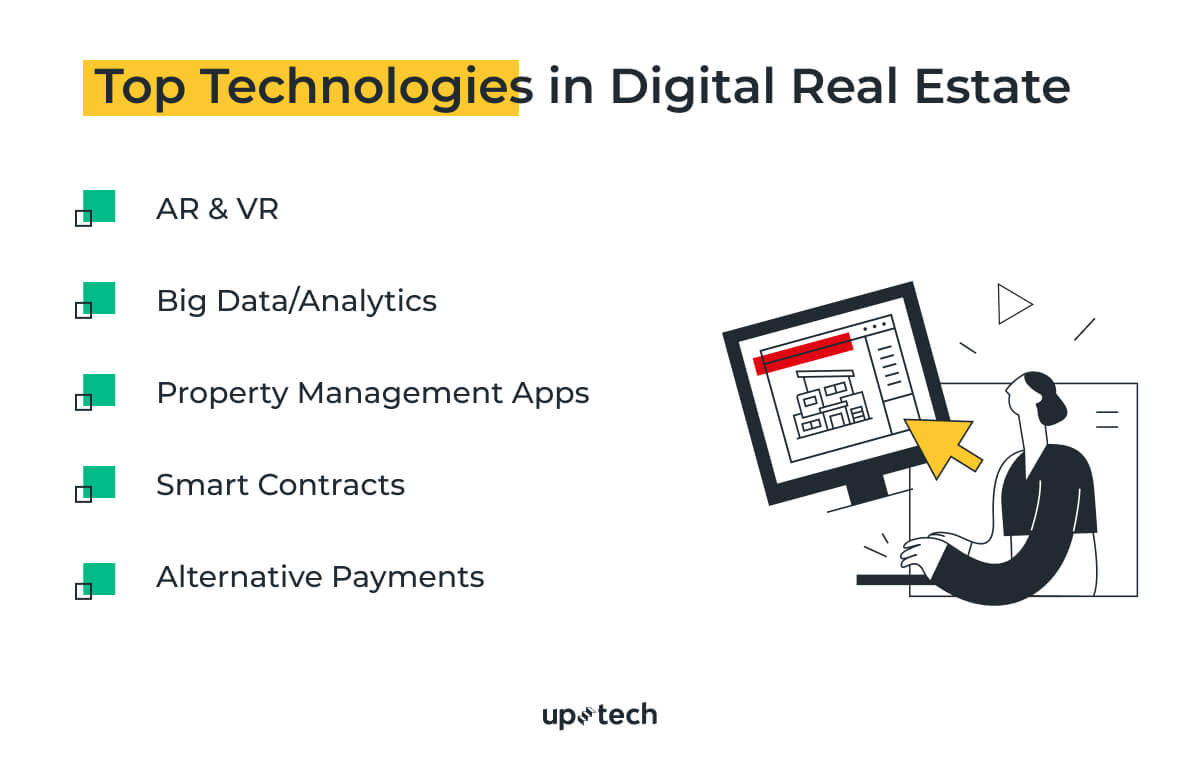
AR & VR
AR & VR technologies can be used to see the property through virtual tours. For example, a real estate company Zillow offered video home tours using VR tech. Users could get directions to the property, unlock the doors when they arrive, and walk the house on their own time. No agents and no appointments needed. Home tours are just one click away.
The market for VR in real estate alone is expected to generate as much as $2.6 billion by 2025.
Goldman Sachs research
Big Data/Analytics
I've mentioned the importance of using big data above and want to highlight it one more time. The truth is, real estate is an industry that collects large data sets regarding property, owners, renters, and agents. If you want to understand your customers better, predict their behavior, and provide them better service, use data analytics solutions.
A simple example is CRM tools that collect customers' data and help you make better and more precise predictions.
Property Management Apps
Crunchbase recently posted:
"You're seeing more Gen Z folks renting and they're way more tech savvy, they're interested in smart home technology, they want to control everything from their phone."
The key to digital transformation is being where your customers are. Since many people use mobile apps to solve their daily tasks, like renting or buying a property, real estate companies should consider developing mobile apps to meet customers' needs. It gives fast access to all the necessary information about the property.
Smart Contracts
Usually, to close a real estate transaction, you should pass a long journey: go to a bank, pick up a bank-certified check or send wire transfers. The process is so inefficient.
Smart contracts are blockchain applications that record contract conditions as computer code. Blockchain technology makes these transactions happen in a matter of seconds. With smart contracts mean bank verifications and middlemen are no longer required. In addition, smart contracts protect you against fraud and reduce costs.
Alternative Payments
According to the WorldPay data, the proportion of North American e-commerce spending from credit cards shrunk by 7% in 2020, and BNPL's share increased by 78%. Digital payments alone aren't enough. It looks like people will continue to demand alternative ways of payments, including BNPL, cryptocurrencies, and pay-with-points (PwP) capabilities.
If you want to win loyalty from customers and generate additional revenue, offer alternative payments.
Digital Transformation in Real Estate: Uptech Case Study
Nomad is a digital real estate platform for buying and renting homes in Dubai. For the context, the real estate market in the Middle East countries is very complex and chaotic. There's no clear home pricing information, a unified platform for property search, and real estate agents are hard to reach. Nomad team wanted to turn the traditional flow into a smooth online experience. This meant they required our digital transformation services in real estate, and we built a lean and smart solution.
Here's a quick peek at some of our work, plus 3 key digital features we implemented along the way.
Listings Search
During the discovery, we found that a full-fledged listing provides thorough information for buyers, which helps real estate agents and property owners sell faster. We included budget range, property type, desired areas, preferable amenities, and a bunch of other filters to the listings to help users find a perfect home.
Dashboard
I recently told you how to transform property management, and the dashboard feature is another great example. It's a tool for keeping track of every potential home. Users can request the apartments they like at once, and the Nomad team will schedule viewings and guide them through the chaotic Dubai real estate market.
Saved Search
Digital transformation is always about a better customer experience. We saved users so much time by implementing the 'saved search' feature. Now they don't need to set up filters every time they look for a property, and Nomad users can save the search criteria once and replicate it.
For more details, check the full Nomad case study.
The Future of Digital Real Estate
With all the latest trends and predictions, I can say for sure that the future of digital real estate is about moving towards a higher level of digitalization. The real estate companies will adopt more and more digital solutions, like virtual home tours, data analytics, process mining, blockchain, etc.
After all, customer experience will be at the center of the transformation. To compete in the real estate market, you should develop new and useful digital solutions.
Real Estate Digital Transformation in Numbers
Check out these interesting figures if you need more convincing reasons to use digital transformation in eal estate.
- The real estate market is expected to have an annual growth rate of 5.2% from 2022 to 2030.
- 58% of real estate companies say they already have a digital strategy.
- 41% of real estate companies say that they have already use technology in redefining their processes.
- 95% of home buyers use the internet to find homes in the U.S. in 2021.
- The proportion of North American e-commerce spending from BNPL's increased by 78%.
- The VR market in real estate is expected to generate $2.6 billion by 2025.
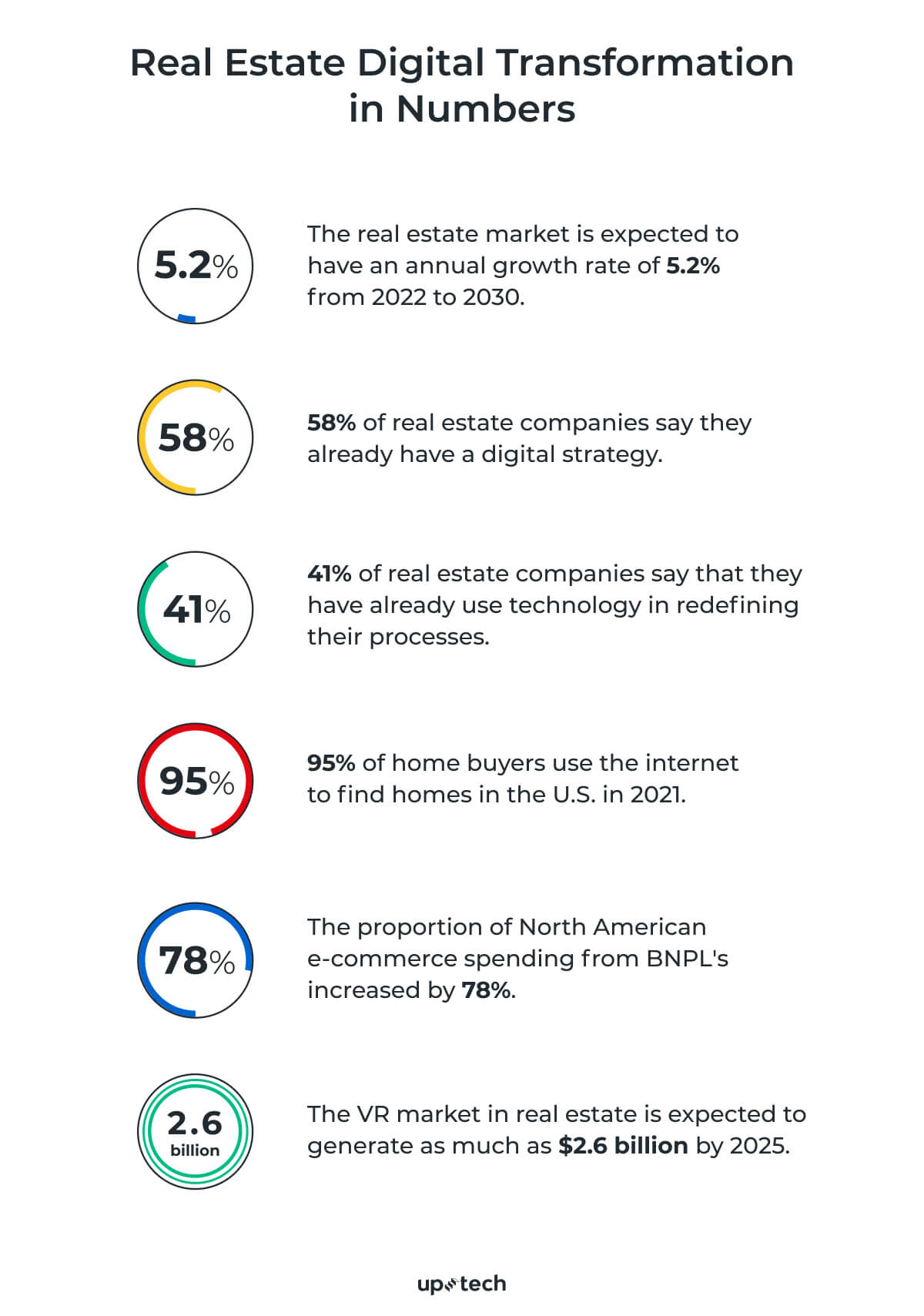
Sum Up
It's fair enough to say that digital transformation disrupted the real estate industry. The idea of digital transformation is to improve the process using new technologies where possible.
Real estate companies adopt digital solutions like blockchain, 3D virtual tours, smart contracts, alternative payments, etc to win in the real estate market. But digital transformation isn't only a competitive advantage, it’s a must-have to satisfy evolving customers' needs. In the next several years, the real estate digital transformation will only expand. So you should keep track of it.
If you have any questions about digital transformation or need help with developing a real estate product, feel free to contact us.












































































.avif)

















